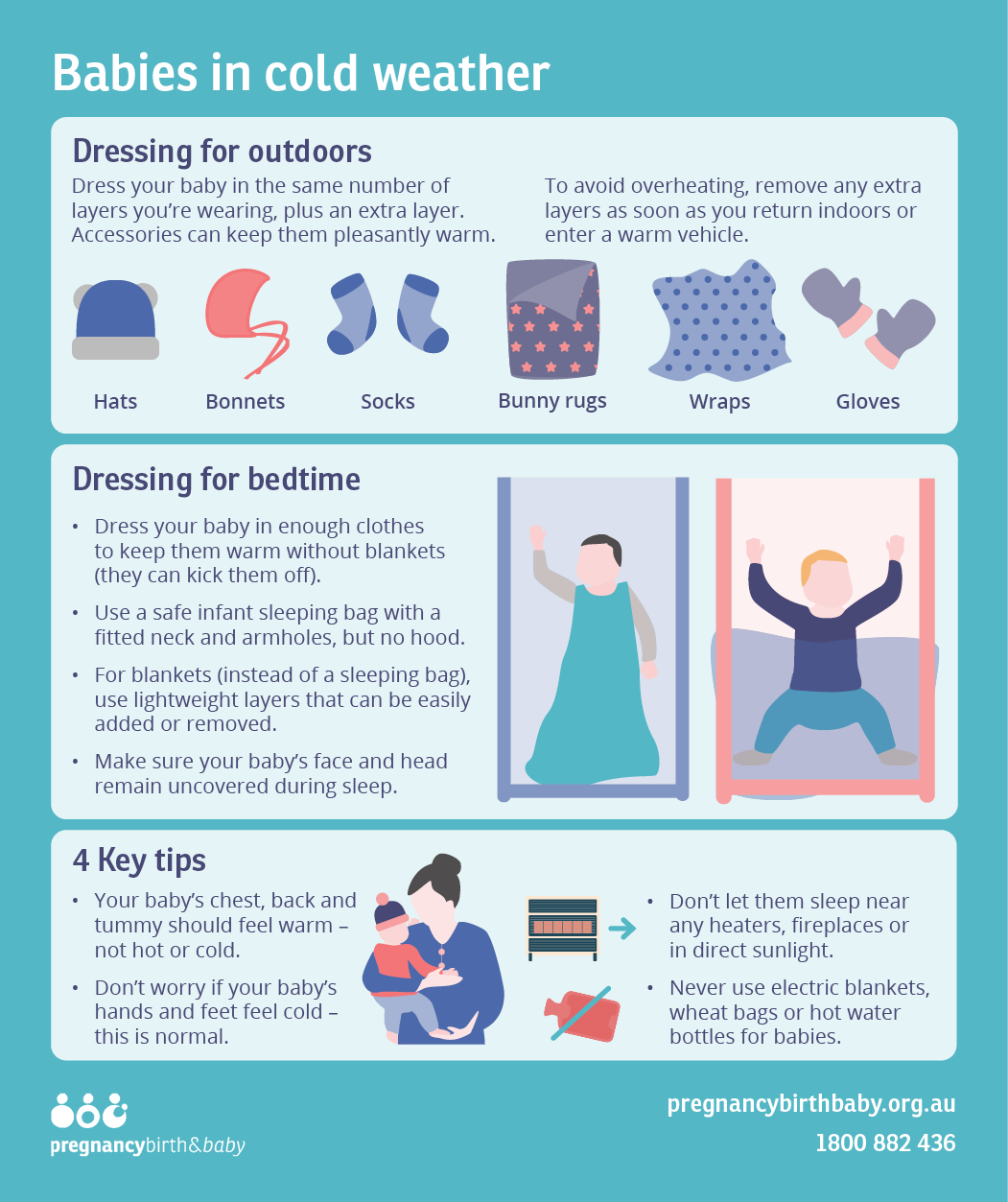Babies in cold weather
8-minute read
Key facts
- Cold weather can impact your baby — they may also overheat if they are dressed too warmly.
- When going out in cold weather, dress your baby in the same number of layers as you, plus one.
- It can be hard to know how your baby is feeling too hot or cold — this can take time and practice.
What are the effects of cold weather on babies?
Babies are smaller than adults and have less muscle mass. This means your child may get cold faster than you.
When a baby is cold, they will feel uncomfortable and are unlikely to sleep well.
Babies are also at a greater risk of developing hypothermia.
When protecting your baby from cold weather, too much clothing can make them too hot.
Cold temperatures can also impact your baby's immune system. This can increase their chances of getting a respiratory infection, like a cold or the flu. Infections like pneumonia can be life-threatening.
How can I tell if my baby is too cold or too warm?
Although your baby's hands and feet may feel cold, this is normal. This may differ from their core body temperature. To give you a better idea if they are warm or cold, feel the skin on their tummy and back. Their skin should feel warm and not too hot or cold.
Your baby's behaviour will give you an insight into how comfortable they feel. Signs that your baby is comfortable include if they are active and feeding normally.
Signs your baby is too cold include:
- shivering
- breathing slowly
- pale, cool skin
Babies who are hot tend to look uncomfortable. Like adults who overheat, a baby's skin will become red and flushed.
Should I take my baby out in cold weather?
It is safe to take your baby out when the weather is cold. Make sure they are dressed warmly and protected from the wind and rain. Outside play and activities help children to learn about how their body responds to the environment.
How can I protect my baby in cold weather?
A good guide for dressing your baby in cold weather is to think about how you are dressed.
Generally, the recommendation is dressing your baby in the same number of layers as you have on, plus one more. Try to dress your baby in lightweight layers that are easy to remove if they warm up. It does not take much for them to overheat if they are dressed or wrapped in thick layers of clothes.
Where possible, consider dressing your baby in natural fibres such as cotton or bamboo. These will help your baby's skin to breathe and not overheat. When the weather is even cooler, dress them in clothing that is closely woven. This will help to keep your baby warm.
Choose clothing that covers your baby's arms and legs. A good option is an all-in-one jumpsuit. It will not ride up and need tucking in.
Your baby may have a more difficult time maintaining their body temperature if:
- they are behind on their development milestones
- they are sick
- the weather is very cold (or hot)
This can put them at a higher chance of having hypothermia. If so, the way you dress them may need more consideration. You can speak to your doctor or child health nurse for advice.
As well as dressing your baby warmly, you can help protect them from infections by practising good hygiene such as hand washing. You should also keep your baby away from others who are sick.
Cold weather outdoors
Dress your baby in layers that are easy to remove if they warm up. It may help to check the weather forecast before you go out. That way, you can pack extra layers of clothing, in case your baby gets wet or becomes cold. It's a good idea to pack spare clothes even if you do not plan to be out in cold weather.
If you are taking your baby out in cold weather in a pram, take a lightweight blanket to cover them. Alternatively, you can carry your baby in a carrier or sling. This way, your body heat will keep them warm. Baby sling safety is important. Follow this checklist to make sure your baby stays safe.
Take your baby's hat or beanie off when you are indoors or in a warm place. This includes when you are in the car or on public transport. This will help prevent them from overheating.
Cold weather at bedtime
Whatever the temperature, it is important that you follow the safe sleeping guidelines when you put your baby to sleep. Because babies control their temperature through their face and head, they should sleep on their back with their head uncovered. This will help to protect them from overheating. Always take your baby's hat or beanie off before they go to sleep. You may like to dress your baby in night clothes so they are more comfortable for sleep.
To keep your baby warm when they are sleeping in their cot, put them in a safe sleeping bag. A correct-sized sleeping bag will help to keep your baby warm, and their face and head uncovered. Make sure the sleeping bag has a fitted neck, armholes or sleeves and no hood. Ideally, you can place a lightweight blanket over your baby's sleeping bag. Make sure the blanket is large to be able to be tucked underneath the mattress to ensure sleep safety.
Never use an electric blanket or a hot water bottle in your baby's cot. These can easily make your baby overheat.
In your baby's cot, avoid using soft bedding like:
- doonas
- pillows
- cot bumpers
- lamb's wool
- sheepskin
These can make your baby overheat. They may also cover your baby's face, which can increase your child's chance of suffocation. Plush toys should also be kept out of your child's cot.
Will my baby sleep more in cold weather?
Babies do not necessarily sleep more in winter. However, it can be easier to care for them when the weather is cool. Like adults, babies like to feel warm and cosy. When you swaddle a baby, they feel more secure.
You do not need to measure the room temperature where your baby will sleep or leave the heating (or cooling) on all night. Make sure you dress your baby in clothes and bedding that are suitable for room temperature.
Resources and support

Speak to a maternal child health nurse
Call Pregnancy, Birth and Baby to speak to a maternal child health nurse on 1800 882 436 or video call. Available 7am to midnight (AET), 7 days a week.
Learn more here about the development and quality assurance of healthdirect content.
Last reviewed: April 2025










